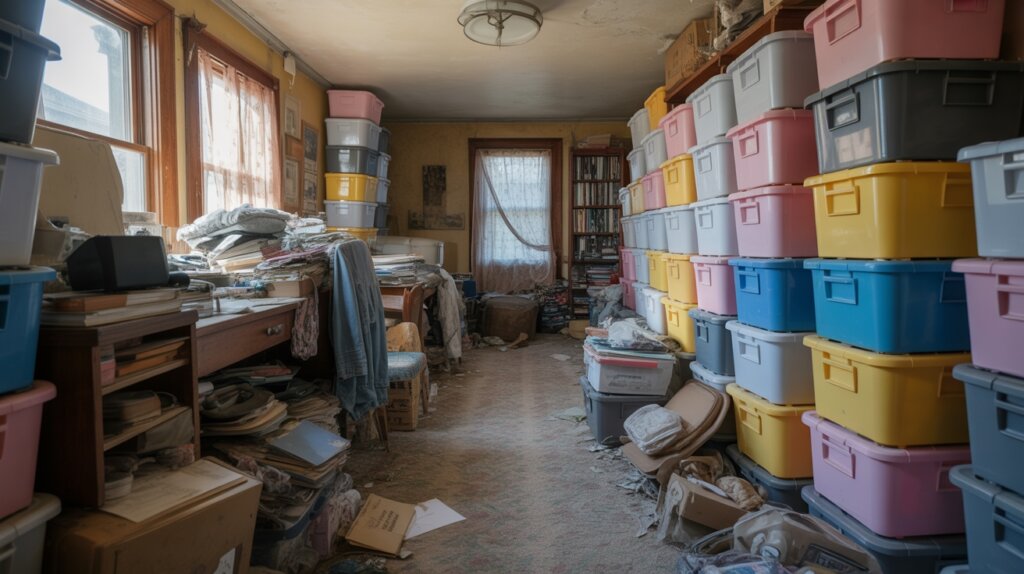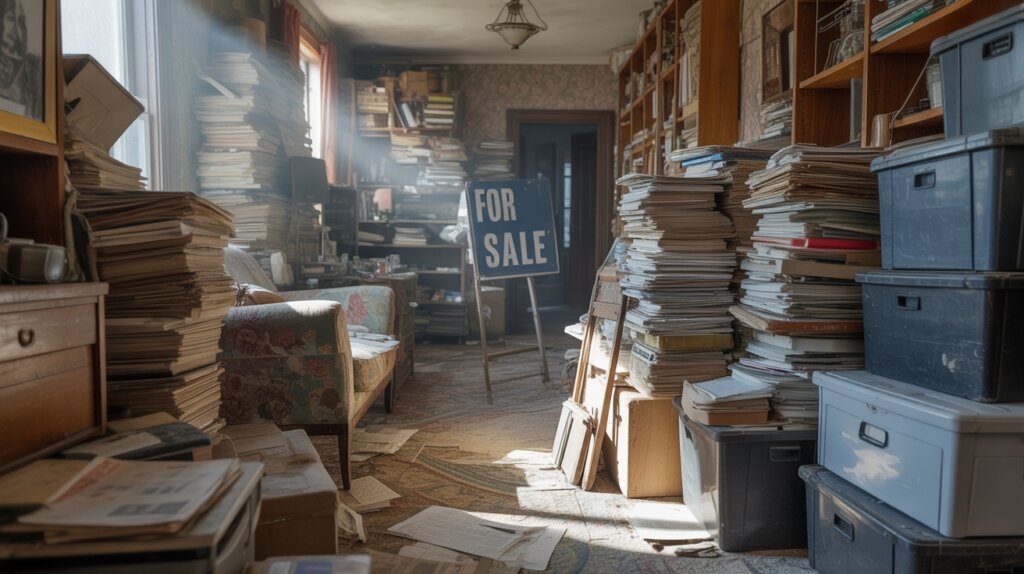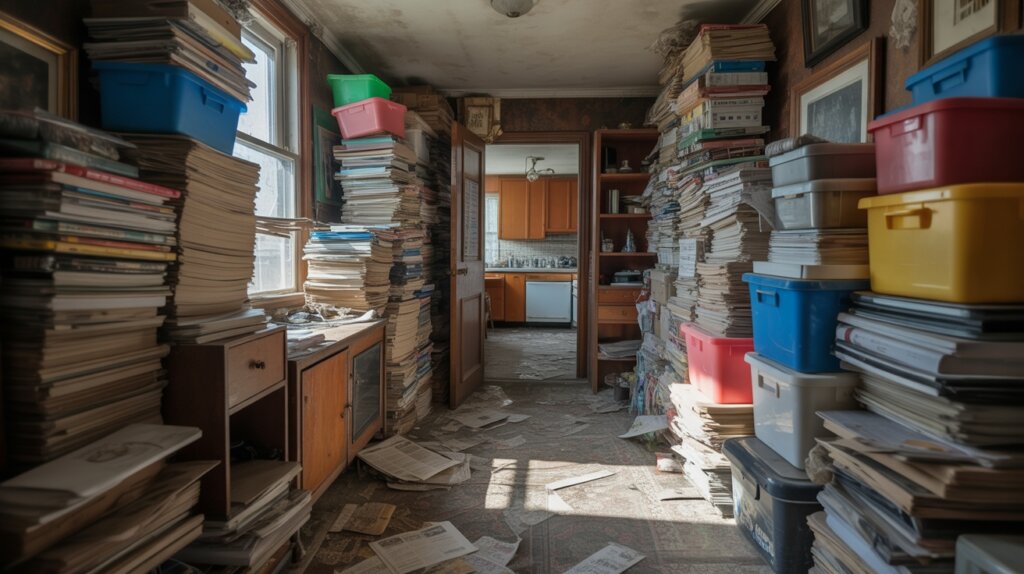Selling a hoarder home comes with serious legal challenges. Many hidden issues can cause trouble for both sellers and buyers. You need to know your responsibilities before listing the property.
If you ignore these problems, you risk fines or lawsuits later. Buyers may back out or demand costly repairs. These situations can delay or even cancel your sale.
The best way to protect yourself is to understand key legal steps before selling a hoarder home. You should learn about disclosure laws and safety codes.
Taking action early will help you avoid stress and extra costs. This blog will guide you through the legal steps needed to sell a hoarder home safely and successfully.
Key Takeaways
- Sellers must fully disclose all known property defects, including hidden damage uncovered during cleaning or inspection, to avoid legal liability.
- Compliance with local health, safety, and building codes is required before listing, including addressing hazards like mold, pests, and blocked exits.
- Conduct thorough inspections and maintain documentation of repairs, remediation, and code compliance to protect against future legal claims.
- Resolve outstanding liens, unpaid fines, and insurance issues before selling to prevent title or financial complications.
- Executors selling a hoarder home in probate must follow court procedures, obtain approvals, and keep detailed records for legal compliance.
Understanding Property Disclosure Laws

Property disclosure laws require sellers to share important information about a home’s condition. If you hide problems, you could face legal trouble. Sellers must tell buyers about any issues that could affect their decision.
Excess belongings can cover up damage like mold, pests, or weak structures. If collections or clutter have hidden problems, you must tell buyers about them. Removing items does not remove your duty to disclose any damage found underneath. Conducting a thorough property review is essential to uncover all potential issues before listing.
Sellers should make a list of the home’s condition before selling. If you are unsure about what to reveal, talk to a real estate attorney. Honest disclosure protects you from future lawsuits and helps buyers make good choices. Additionally, conducting a thorough title search helps identify any legal issues that need resolution before sale.
Complying With Local Health and Safety Codes
You must follow local health and safety codes before selling a hoarder home. These codes cover issues like pests, blocked exits, and unsafe structures. If the home does not comply, you may face legal problems or delays. Ensuring compliance can also help prevent longer market time and avoid potential liabilities. Hoarder homes often have mold, biohazards, or poor air quality.
These issues can harm future owners. Ignoring them can lead to liability for you as the seller. If you address these problems early, you protect yourself and buyers. Remediation professionals can help clean and repair the home. Fixing hazards demonstrates home safety and responsibility to prospective buyers. Addressing health concerns proactively can also streamline the sale process and reduce the risk of legal action.
Required Inspections and Certifications

You’ll need to secure mandatory property condition reports, as well as thorough pest and mold assessments, before listing a hoarder home. Local health department approvals may also be required to demonstrate compliance and protect both parties. These steps help you address potential liabilities and streamline the sale process.
Ensuring the company you work with uses its own funds can also provide additional confidence in the transaction. Additionally, conducting comprehensive inspections helps verify that the property meets habitability standards, reducing legal risks after the sale.
Mandatory Property Condition Reports
Mandatory property condition reports are required by many state and local laws. These reports are very important when selling a hoarder home. Sellers must clearly describe any problems with the home’s structure, systems, or safety.
Reports help protect sellers from legal issues. If buyers know the home’s true condition, they can make informed decisions. Marketing efforts like staging or virtual tours do not replace the need for honest disclosure.
Accurate reports prevent buyers from being misled by attractive photos. Sellers should collect professional inspections and keep all paperwork organized. If you are unsure about what to disclose, ask your real estate agent or lawyer.
Following property condition rules can make your sale smoother. Proper reports lower the risk of future legal trouble. Being open and prepared helps both you and the buyer.
Pest and Mold Assessments
Pest and mold assessments are often required when selling a hoarder home. These checks ensure the property is safe for new owners. Buyers and authorities want proof the home is free from health hazards.
Hoarding can hide pests and mold that may go unnoticed. Licensed inspectors should check for infestations and hidden mold. If issues are found, you must fix them quickly to meet legal rules.
You should clear out excess belongings before any inspection. Removing clutter helps reveal hidden problems. Inspectors can do a better job in a tidy space.
Keep records of all inspections and treatments. These documents protect you if questions arise later. Proper paperwork also helps build trust with buyers.
Local Health Department Approvals
Local health department approvals are required before selling a hoarder home. These approvals confirm the property is safe and meets basic health standards. Without them, you may not be able to complete the sale.
Health departments check for hazards like mold, pests, and biohazards. If issues exist, you must fix them before listing your home. Inspections and certifications are usually needed.
You should keep all paperwork as proof of compliance. If you skip these steps, you could face delays or legal problems. Proper approval helps make the sale process smoother.
Addressing Zoning and Code Violations
You need to identify any existing zoning or code violations before putting your hoarder home on the market. Addressing these issues upfront helps you avoid legal setbacks and costly delays. Ensure you bring the property into compliance so you can move forward with a smooth sale.
Additionally, understanding the current market value of your house can help you make informed decisions about whether to sell quickly to a cash buyer or wait for a potentially higher offer. Being aware of common legal pitfalls associated with selling hoarder homes can further protect you from unexpected liabilities.
Identifying Existing Violations
It is important to check for zoning or code violations before selling a hoarder home. Existing violations can delay or prevent a sale. If you miss these issues, you may face fines or costly repairs.
Common violations include rooms or garages changed without city permits. Sometimes, piles of belongings block doors or windows, breaking safety rules. Unchecked electrical or plumbing work can also be a problem.
Review city records and ask for a professional inspection. If you find violations, fixing them early can help your sale go smoothly. Always follow your local laws during this process.
Compliance Before Listing
You must fix any violations before listing your home for sale. Unresolved issues can delay or stop the selling process. They may also reduce your home’s value.
Start by contacting your local code office to learn what needs repair. If there are environmental hazards like mold or asbestos, remove them first. These problems can cause health risks and legal trouble.
Remove clutter and dangerous materials as your city requires. If you find it hard to let go of items, remember that safety and rules are more important. Keep records of all repairs and clean-up work.
Buyers and their agents will ask for proof of compliance. If you fix violations early, you make the sale process smoother. This also lowers the risk of legal problems later.
Managing Hazardous Materials and Waste
Managing hazardous materials and waste is important when preparing a hoarder home for sale. Hazardous materials include chemicals, old medicines, and biological waste. If these are not handled correctly, health and legal problems can occur.
Start by checking the home for any hazardous items. If you find any, follow all local and national rules for safe removal. You should always keep records of how you cleaned and disposed of these materials.
Begin by looking for hazardous items, and follow all regulations for removal—keeping thorough records of your cleanup and disposal process.
Certified professionals can help with hazardous waste removal. They know the correct procedures and have the right equipment. If you use them, you reduce your risk of mistakes.
Always wear personal protective equipment when dealing with dangerous substances. PPE includes gloves, masks, and protective clothing. This helps keep you safe during cleanup.
Keep all receipts and documents that show how you disposed of hazardous waste. If someone questions your process, you can show proof of proper handling. These records will help you avoid legal issues.
A thorough liens search can also help identify hidden legal obstacles that may arise during the sale process, ensuring you are fully prepared to handle any issues.
Additionally, conducting a comprehensive hazardous material assessment can identify potential risks early, allowing for proper planning and mitigation before listing the property.
Navigating Nuisance Complaints From Neighbors

You may get nuisance complaints from neighbors if your property has hoarding issues. These complaints are usually about clutter, bad smells, pests, or safety concerns. It is important to handle these complaints quickly and carefully.
You should talk with neighbors and show that you understand their worries. If you receive a complaint, document each conversation in case you need it later. Working with professionals can help you clean the property, remove odors, and follow local rules.
If you take care of visible problems like overgrown yards or blocked walkways, you show respect for the neighborhood. This can help reduce conflicts and improve your chances of selling the home.
Addressing these issues can also lower legal risks during the sale. Legal and compliance issues related to distressed properties can be complex, so consulting with experts can help ensure you meet all requirements. Additionally, understanding property basis adjustments can be crucial when navigating legal considerations in distressed property sales.
Dealing With Liens and Outstanding Fines
You must resolve any liens or unpaid fines before selling a hoarder home. Liens or fines can stop the sale or scare buyers away. A title search will show any liens or fines on the property.
If you find liens or fines, deal with them right away. Ignoring them can lead to extra charges or legal action. Municipalities often collect fines quickly.
You should ask lien holders or the local government for a payoff statement. If you cannot pay in full, try to set up a payment plan or settle for less. A real estate attorney can help you follow local rules.
Understanding property lien types and their implications helps you navigate potential obstacles and ensure a smooth sale process. Additionally, being aware of title resolution strategies can assist in effectively addressing unresolved issues and avoiding future complications.
Insurance Implications for Sellers
Selling a hoarder home affects your homeowner’s insurance. Hoarding can lead to more property damage, injuries, or liability issues. Insurance policies often exclude damage from neglect or unsafe conditions. It is important to review your policy for any coverage limitations related to property neglect or hazards. If you file a claim during the sale, the insurer might deny it due to these exclusions.
Sellers should document the home’s condition with photos and notes. Any safety hazards should be fixed before listing the property. Consult your insurance agent if you have questions about your coverage. Addressing risks early helps avoid denied claims or surprise costs. Careful planning can protect you as you sell your home.
Negotiating As-Is Sales and Buyer Agreements
Selling a hoarder home as-is can make the process faster and reduce your risks. An as-is agreement means the buyer accepts the home’s current condition. If you use this approach, always make sure buyers know exactly what they are getting.
Clear documentation and full disclosures are important to avoid legal problems later. Sellers should list all known issues with the home in writing. Buyers must be allowed to inspect the property before finalizing the deal.
Thorough documentation and disclosure of all known issues protect sellers from future legal trouble and give buyers confidence to inspect before purchase.
Simple home staging, such as basic decluttering, can help attract better offers. Quality photos with good lighting will show the home at its best. If you follow these tips, you may get a higher sale price.
If you outline defects and say no repairs will be made, buyers know what to expect. This approach helps attract serious buyers. It also limits legal risks after the sale.
Working With Real Estate Agents Familiar With Hoarder Homes
You need a real estate agent who understands the unique challenges of hoarder homes and can implement specialized marketing strategies. They’ll help you attract the right buyers while ensuring you meet all legal disclosure requirements. Partnering with an experienced agent reduces your risk and streamlines the sale process.
Specialized Marketing Strategies Needed
Selling a hoarder home needs special marketing strategies. These methods help attract buyers who see potential in such properties. Real estate agents with experience in this area are important for success.
Agents can target investors, renovators, and bargain hunters. They know how to advertise to buyers interested in homes that need work. If you use their skills, you will avoid buyers who are not serious.
You can highlight the investment value with before-and-after ideas in your listing. Targeted ads can reach cash buyers or those who buy distressed homes. Virtual tours or “as-is” open houses help find real interest.
If you use these strategies, you will increase your home’s exposure and value.
Navigating Disclosure Requirements
You must disclose all known problems when selling a hoarder home. This includes any damage or issues hidden by clutter. Full disclosure protects you from legal trouble later.
A real estate agent with hoarder home experience can help. They will guide you on what to report and how to document the property’s condition. If you follow their advice, you can avoid mistakes and set clear expectations for buyers.
The agent can also explain cleaning and repair steps to buyers. Proper communication builds trust and reduces misunderstandings. Clear records and honest disclosures limit your future liability.
Legal Risks of Selling Without Proper Cleanup
Selling a home without proper cleaning can lead to legal trouble. If you skip cleanup, you risk breaking the law. Buyers and city officials may take action against you.
Buyers can sue if they find undisclosed dangers. City inspectors may fine you for not meeting property standards. Your reputation as a seller could also suffer.
If you want to avoid these problems, always clean and fix issues before listing. This protects you legally and builds trust with buyers. Emotional concerns also matter, so handle them with care.
Handling Estate or Probate Issues
When a hoarder home is part of an estate, you’ll need to navigate the probate court process before selling. As executor, you’re responsible for managing legal filings, securing the property, and ensuring compliance with court orders. Understanding your duties early helps you avoid delays and legal complications.
Navigating Probate Court Process
Probate court is a legal process required to handle a deceased person’s estate. You must follow probate rules before you can sell a hoarder home. The court decides who has the right to manage and transfer the property.
If you are responsible for the estate, you need to file the will and probate forms. This step gives you legal authority to act. Without it, you cannot make decisions about the home.
A professional property valuation is usually required by the court. This helps set a fair price for the property. Accurate valuation also protects you from legal issues.
You must follow the court’s instructions about notifying heirs and creditors. If you fail to do this, there may be delays. Careful attention to each step can help avoid problems.
Executor Responsibilities Explained
An executor manages the legal and practical tasks for a hoarder home’s estate. The main job is to secure the property and list all assets. Executors must find and record any valuable collections or personal items.
A detailed inventory helps prevent arguments among heirs. Executors should check if the estate’s assets can pay debts, taxes, and repair costs. If needed, they can hire appraisers, cleaners, or lawyers.
All actions and communications must be recorded. Good organization helps avoid mistakes and legal issues. Executors who stay transparent and careful meet their responsibilities well.
Protecting Yourself Against Post-Sale Litigation
Selling a hoarder home can lead to legal problems after the sale. You should take steps to protect yourself from these risks. Careful action now can help prevent future lawsuits.
Sellers must be honest about the home’s condition, especially after cleaning and junk removal. If buyers find hidden problems, they may take legal action. Full disclosure is a key way to avoid this.
You should keep all receipts and records for cleaning and repairs. Take photos before and after work is done. These documents can help defend you if issues come up later.
If you follow these steps, you can lower your risk of being sued after the sale. Clear records and honest communication are your best protection.
Consulting With Legal and Real Estate Professionals
Consulting legal and real estate professionals is important when selling a hoarder home. They help you understand complex laws and guide you through the process.
A real estate agent with experience in distressed properties can give you accurate advice. The agent will help you set a fair price and address needed repairs. If you have environmental hazards, the agent can help you handle them.
An attorney will make sure you follow all disclosure laws. The attorney checks that you share all required information with buyers. If you miss something, legal problems could happen.
Professional guidance helps you avoid mistakes and reduce risks. You should contact these experts early. If you do, you can make better decisions and have a smoother sale.
Conclusion
If you plan to sell a hoarder home, you should prepare for legal considerations. Understanding local disclosure laws and health codes can help you avoid legal trouble. If you address all required inspections and repairs, you will protect yourself from future disputes.
If you need a fast and easy solution, we buy houses for cash, including hoarder homes. If you want to skip repairs and paperwork, we can help you move forward. If you work with professionals, you can make the sale smooth and stress-free.
If you are ready to sell your hoarder home, contact Greg Buys Houses today. We will give you a fair cash offer and handle all the details. If you want peace of mind, let us guide you through the process.

